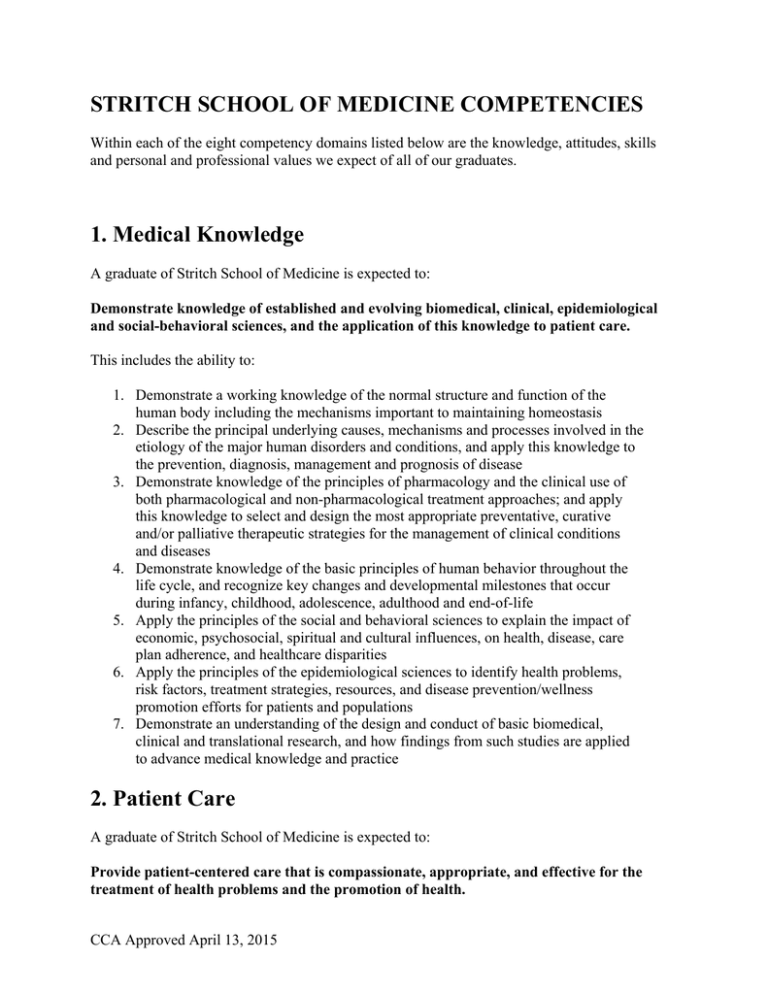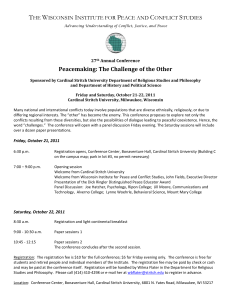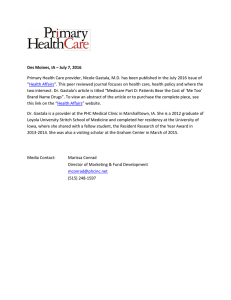SSOM Competencies - Stritch School of Medicine
advertisement

STRITCH SCHOOL OF MEDICINE COMPETENCIES Within each of the eight competency domains listed below are the knowledge, attitudes, skills and personal and professional values we expect of all of our graduates. 1. Medical Knowledge A graduate of Stritch School of Medicine is expected to: Demonstrate knowledge of established and evolving biomedical, clinical, epidemiological and social-behavioral sciences, and the application of this knowledge to patient care. This includes the ability to: 1. Demonstrate a working knowledge of the normal structure and function of the human body including the mechanisms important to maintaining homeostasis 2. Describe the principal underlying causes, mechanisms and processes involved in the etiology of the major human disorders and conditions, and apply this knowledge to the prevention, diagnosis, management and prognosis of disease 3. Demonstrate knowledge of the principles of pharmacology and the clinical use of both pharmacological and non-pharmacological treatment approaches; and apply this knowledge to select and design the most appropriate preventative, curative and/or palliative therapeutic strategies for the management of clinical conditions and diseases 4. Demonstrate knowledge of the basic principles of human behavior throughout the life cycle, and recognize key changes and developmental milestones that occur during infancy, childhood, adolescence, adulthood and end-of-life 5. Apply the principles of the social and behavioral sciences to explain the impact of economic, psychosocial, spiritual and cultural influences, on health, disease, care plan adherence, and healthcare disparities 6. Apply the principles of the epidemiological sciences to identify health problems, risk factors, treatment strategies, resources, and disease prevention/wellness promotion efforts for patients and populations 7. Demonstrate an understanding of the design and conduct of basic biomedical, clinical and translational research, and how findings from such studies are applied to advance medical knowledge and practice 2. Patient Care A graduate of Stritch School of Medicine is expected to: Provide patient-centered care that is compassionate, appropriate, and effective for the treatment of health problems and the promotion of health. CCA Approved April 13, 2015 This includes the ability to: 1. Collect and record information about patients and their conditions through history taking, physical examination and interpretation of diagnostic testing 2. Apply critical thinking and clinical reasoning skills in developing a prioritized differential diagnosis 3. Develop patient evaluation and management plans appropriate to all levels of patient acuity, in both the ambulatory and inpatient settings, utilizing pertinent patient information, relevant scientific evidence and appropriate clinical judgment 4. Demonstrate competence in clinical and core procedural skills to provide basic patient care 5. Counsel and educate patients and their families to empower them to participate in their own care and enable shared decision-making 6. Apply the principles of health promotion and screening for disease to the care of patients, families and communities 7. Utilize electronic health records to provide effective care of patient and populations 3. Interpersonal and Communication Skills A graduate of Stritch School of Medicine is expected to: Demonstrate interpersonal and communication skills that result in the effective exchange of information and collaboration with patients, their families, and health professionals. This includes the ability to: 1. Provide accurate, concise and well-organized oral presentations of clinical encounters 2. Communicate effectively when counseling and educating patients and families across the broad range of socioeconomic and cultural backgrounds 3. Communicate effectively with peers and other health care professionals, including during transitions of care 4. Create and maintain comprehensive and accurate medical records, avoiding reliance on the unreflective use or reproduction of prior entries 5. Demonstrate empathy, sensitivity, transparency, and compassion in interpersonal interactions, particularly during difficult conversations 6. Participate in the education of peers and other health professionals 4. Practice-Based Learning and Improvement A graduate of Stritch School of Medicine is expected to: Demonstrate the ability to investigate and evaluate one's care of patients, to appraise and assimilate scientific evidence, and to improve patient care based on continuous reflection, self-evaluation and life-long learning. CCA Approved April 13, 2015 This includes the ability to: 1. Evaluate, in a critical and systematical manner, one's performance, to identify strengths and personal limitations in knowledge, skills, behaviors and/or attitudes 2. Set individual learning and improvement goals to address deficiencies and actively engage in appropriate activities to meet those goals 3. Seek out formative help and advice, where appropriate, from supervisors, advisors, mentors, peers, and relevant support services, using feedback to positively modify personal performance and behavior 4. Demonstrate curiosity, objectivity, and an analytic approach to clinical situations, identifying reliable strategies for sustaining these processes throughout one's professional career 5. Demonstrate an ability to identify, objectively evaluate and apply in practice information from emerging basic biomedical, clinical and translational research 5. Professionalism A graduate of Stritch School of Medicine is expected to: Demonstrate a conscientious commitment to carrying out professional responsibilities and an adherence to ethical principles. This includes the ability to: 1. Demonstrate self-respect and respect for others at all times 2. Demonstrate integrity and personal accountability in fulfilling, in a complete and timely manner, all obligations and expectations related to one's designated professional role 3. Demonstrate respect for patients and responsiveness to their needs, including privacy and autonomy 4. Demonstrate sensitivity to patients from diverse backgrounds, including diversity in gender, age, culture, race, religion, disability and sexual orientation 5. Demonstrate understanding of ethical principles pertaining to the provision of care 6. Recognize and, when an obligation exists, report unethical and impaired behavior of members of the health care team, including peers 6. Systems Based Practice A graduate of Stritch School of Medicine is expected to: Demonstrate discriminating awareness of and responsiveness to the larger context and evolving state of health care delivery, as well as an ability to effectively engage resources within the system to optimize delivery of care to patients and populations. This includes the ability to: CCA Approved April 13, 2015 1. Recognize the relative merits of care provided in varied health care delivery settings, including consideration of cost-effectiveness and risk-benefit analysis 2. Recognize when and how to utilize partners within healthcare systems to improve the delivery of patient care 3. Apply the principles of patient safety and quality improvement in all aspects of health care delivery 4. Demonstrate a commitment to the provision of socially just healthcare 7. Interprofessional Collaboration A graduate of Stritch School of Medicine is expected to: Demonstrate the ability to effectively collaborate in the delivery of interprofessional teambased patient care. This includes the ability to: 1. Collaborate with all health professionals to help establish and maintain a climate of mutual respect, dignity, diversity, ethical integrity, and trust 2. Apply the knowledge and understanding of different health professional roles and the value of their contributions to timely, efficient, effective and equitable team-based health care 3. Communicate with all health professionals in a responsive and responsible manner that enhances team-delivered care to patients 8. Personal and Professional Development A graduate of Stritch School of Medicine is expected to: Demonstrate the qualities required to assure lifelong personal and professional growth. This includes the ability to: 1. Demonstrate personal responsibility for maintaining one's own physical and mental wellbeing, including work-life balance, by employing healthy coping strategies and seeking appropriate assistance when needed 2. Demonstrate an ongoing commitment to pursuing appropriate learning opportunities for the purpose of personal and professional growth and development 3. Demonstrate progressive acquisition of leadership and resource-stewardship skills CCA Approved April 13, 2015


